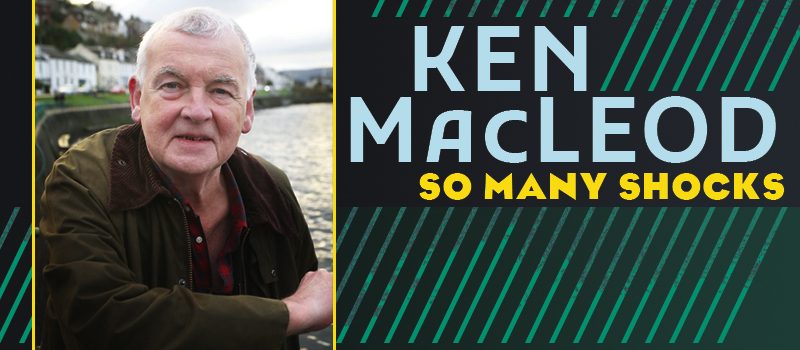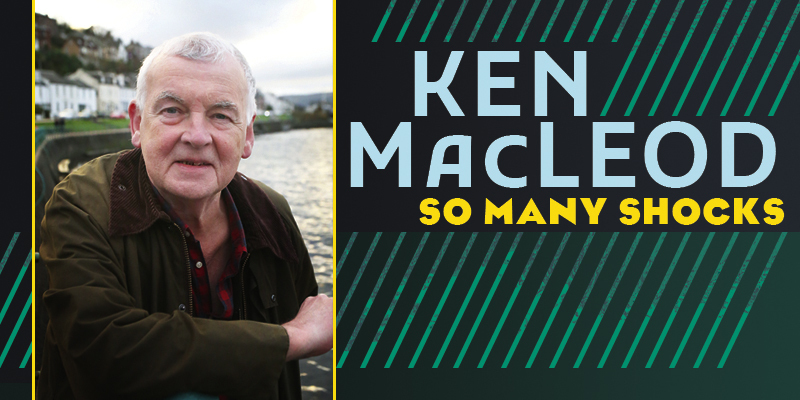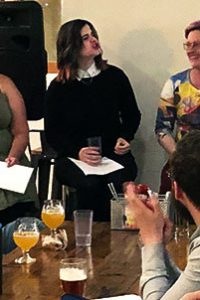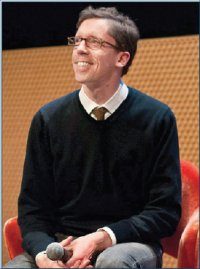Ken MacLeod: So Many Shocks
KENNETH MACRAE MACLEOD was born August 2, 1954 in the Western Isles of Scotland. He attended Glasgow University, earning a degree in zoology in 1976, then studied biomechanics at Brunel University outside London. He took a decade-long break from reading SF, and became a computer programmer for ten years. In 1988 he completed a Master’s degree in Biomechanics.
After finishing his thesis, he tried his hand at fiction, producing first novel The Star Fraction (1995), a Clarke Award runner-up and winner of the Prometheus Award. That novel began his four-book Fall Revolution sequence, which explores communism, socialism, and libertarianism. The Stone Canal (1996) won a Prometheus Award as well, and the books did well enough to allow MacLeod to become a full-time writer in 1997. Nebula nominee The Cassini Division (1998) followed, and The Sky Road (1999) won a British Science Fiction Association Award.
His next series, Engines of Light, began with Cosmonaut Keep (2000), and includes Dark Light (2000) and Engine City (2002). The Corporation Wars trilogy is Dissidence (2016), Insurgence (2016), and Emergence (2017). His Lightspeed trilogy has Beyond the Hallowed Sky (2021) and Beyond the Reach of Earth (2023), with Beyond the Light Horizon forthcoming; novella ‘‘Cold Revolution Blues‘‘ (2016) is set in the same world.
Other novels include Campbell Memorial Award finalist Newton’s Wake: A Space Opera (2004), Hugo nominee Learning the World (2005), Clarke Award finalists The Execution Channel (2007) and Intrusion (2012), BSFA Award Winner The Night Sessions (2008), The Restoration Game (2010), and Descent (2014).
His significant short work includes Sidewise Award-winning novella The Human Front (2001), novelette The Highway Men (2006), Hugo Award finalist ‘‘Who’s Afraid of Wolf 359?‘‘ (2007), Earth Hour (2011), and Selkie Summer (2020). Some of his stories and essays are collected in The Invasion Dream (2006) and Giant Lizards from Another Star (2006), which also includes YA tie-in novel The Web: Cydonia (1998).
Some poetry and essays are collected in Poems & Polemics (2001), while Poems (2016) collects poetry by MacLeod and his longtime friend Iain Banks. He curated art book The Culture: Drawings (2023), posthumously collecting material by Banks.
Andrew M. Butler and Farah Mendlesohn edited The True Knowledge of Ken MacLeod (2003), a collection of critical essays about his work.
Excerpt from the interview:
“What I tend to end up doing – more than I should, perhaps – is to write a trilogy, swear I’ll never write a trilogy again, write two or three standalone novels, and then write another trilogy. I’m currently in the stage of swearing to never write a trilogy again.
“My last trilogy before the Lightspeed Trilogy was The Corporation Wars. It’s kind of about AI, but it’s a certain imagining of AI as, essentially, friendly. Humanity basically outsources most of the hard work to various AIs, and sets about spreading itself through the universe. The AIs travel for scores of light-years, set up nanotech factories in orbit around promising stars, and terraform any promising planets, and if this takes 20,000 years, so be it. Then they reconstitute people out of data and raise them one way or another and send them forth. There is a very implausible idea of, more or less, flash-frozen brains being transcribed into AI, and all the shenanigans of the plot of these novels come about from what the AI companies and corporations do with the uploaded mind-states of very nasty people. Or people who range from very nasty to morally dubious.
“They weren’t meant as a terribly serious speculation on the future of AI. One of the things that I used to anchor the Lightspeed Trilogy and its backstory, was, maybe ten years ago, I was asked by Dr. Stephen Parnell of Newcastle University to take part in a student project on architecture in the Dutch city of Rotterdam. What they wanted me to do was to imagine what this particular patch of land in Rotterdam would be like in 70 years. That was 70 years after Rotterdam was bombed flat in 1944, and it has been rebuilt since, and they wanted to imagine the city 70 years from the present. All I really had to do was write a long short story, 10,000 words or so, set in the architecture those students imagined. To my delighted surprise, the architecture students came up with this wonderful, layered piece of worldbuilding for a future Rotterdam, accounting for things like sea level rise, Holland departing the EU and later rejoining a transformed EU, and so on.
“Dr. Parnell, in a brainstorming session, brought up the idea of anticipatory algorithms, which is basically what Amazon uses: You like these books and music, so you might like these too, and so on. Anticipatory algorithms, when you think of it, are everywhere. That, of course, got my sci-fi brain ticking over about an anticipatory algorithmic artificial intelligence: an AI that knew what you expected, and what you wanted, and tried to anticipate your wants. That gave rise to the idea of, ‘What if someone tried to run an entire economy on these algorithms?’ So, essentially, you got a very consumer-friendly planned economy, or if not exactly planned, non-market, or the beginnings of that.
“That turned into a novella called ‘Cold Revolution Blues’, involving a character named Marcus Owen. That actually came out, to my enormous pride, just a couple years ago in the New Worlds anthology from PS Publishing. New Worlds was the very first magazine I ever tried to submit a story to, when I was very young; it had the audacious twist of a starship pilot arriving at a strange, alien planet that turns out to be Earth – far too radical an idea for New Worlds. I got my first rejection slip from Hilary Bailey, who was the editor at the time. It was a matter of great pride for me to be in that anthology.
“Various ideas went into the Lightspeed series: one of them was what I called ‘socialism with European characteristics,’ a play off, obviously, Chinese socialism, and how that might tie into anticipatory algorithms. I was at the point of frantically trying to think of ideas for my next book to pitch to my agent and editor, and I looked through some old notebooks that I had written when I was a student – probably when I was in my teens and early twenties – and this was the idea: a very near future with faster-than-light travel, which is: ‘What if FTL was discovered last year? What if FTL travel was discovered, like, now? Or in 2018, along with Trump, Putin, all the rest of it?’
“I had all these ideas from my past notes about near-future FTL and near-future politics, so I threw them into the mix, and the way the AI thing came into it was that, eventually, you end up with three superpowers: the Union, the Coordinated States, and the Alliance. Each of them has its own AI descendant of Alexa, essentially. The Union is, roughly, the present European Union plus Scotland, and minus England. Both Scotland and Ireland are in it, but England isn’t. England is in the Alliance, which is the Anglosphere, including India. The Coordinated States are something like a development of present-day China, with Russia sort of tagged on. The Union is this very self-righteous, supposedly democratic socialist society that has emerged at what is called the Rising, two decades in the past; I guess it’s the 2030s in the timeline. They’re attempting a very slow transformation away from capitalism, in a gradual transition which they call the Cold Revolution. They have their own friendly AI, called Iskander. The Coordinated States have WeThink, and the Alliance have Smart-Alec. These AI sort of follow in the background. I don’t think the books necessarily take the serious conversation of artificial intelligence very far forward.
“At the moment, AI are much worse than they are in my books. The way that AI ‘hallucinate’ – which is a technical term, now, in large language models – is, they just make things up! Charlie Stross and I and some others meet up for a virtual pub nearly every week, drinking over Zoom; it started in lockdown and then continued, in a diminished way. Charlie has tried putting his own name into those AI engines, saying, ‘Tell me five fun facts about Charles Stross.’ At first, it came up with a fairly acceptable, roughly correct version. But then, as he started asking it more questions, it started spinning out the most outrageous nonsense – but still plausible-sounding nonsense if you didn’t know who Charlie Stross was.
“One of the things that I honestly did not anticipate as a consequence of large language models and AI is that it would fill the internet with rubbish! I think my detectors are still sufficiently calibrated to pick up AI-generated text – not infallibly, but I can usually tell a news item that is true from one that has been written by ChatGPT or whatever. These large language models can now generate scientific papers with plausible-sounding bibliographies, including plausible-looking references to other scientific papers that don’t exist! I suppose, in the extreme case, we might be reduced to hard copy. We might have to say, ‘You have to look things up in an actual physical book or paper before you can cite it.’ Which is going to be one heck of a nuisance!
Interview design by Francesca Myman
Read the full interview in the April 2024 issue of Locus.
 While you are here, please take a moment to support Locus with a one-time or recurring donation. We rely on reader donations to keep the magazine and site going, and would like to keep the site paywall free, but WE NEED YOUR FINANCIAL SUPPORT to continue quality coverage of the science fiction and fantasy field.
While you are here, please take a moment to support Locus with a one-time or recurring donation. We rely on reader donations to keep the magazine and site going, and would like to keep the site paywall free, but WE NEED YOUR FINANCIAL SUPPORT to continue quality coverage of the science fiction and fantasy field.
©Locus Magazine. Copyrighted material may not be republished without permission of LSFF.









